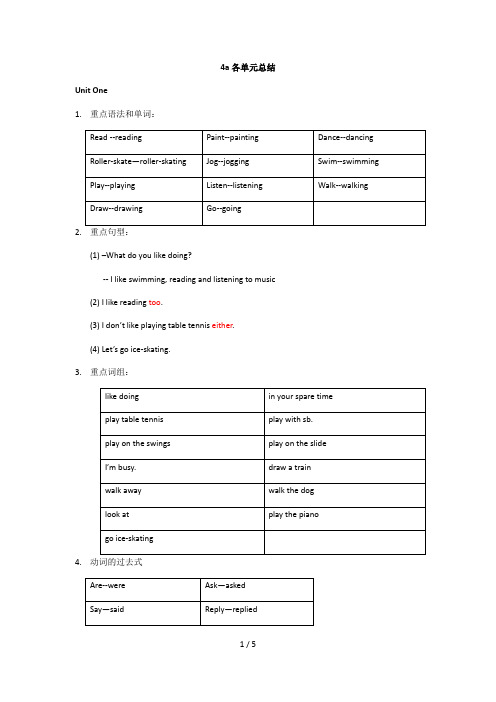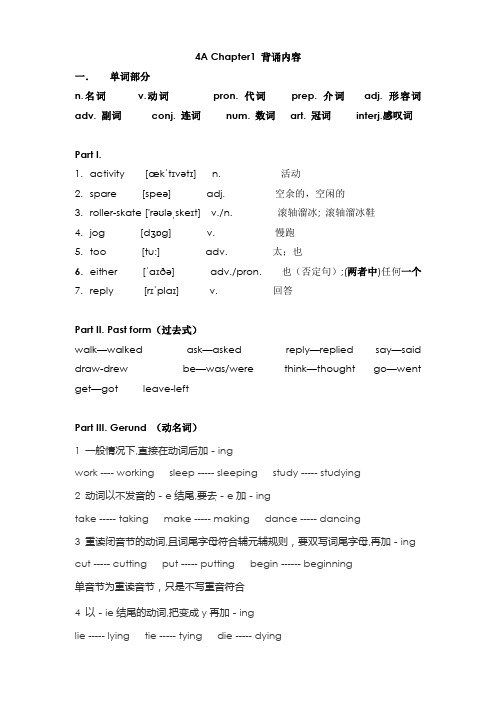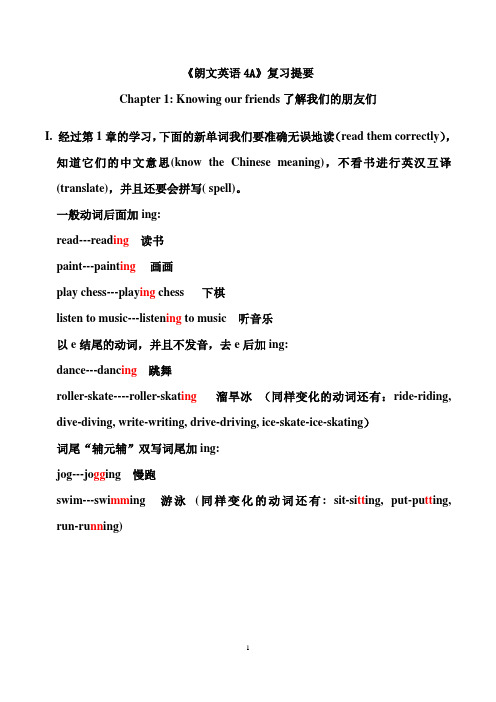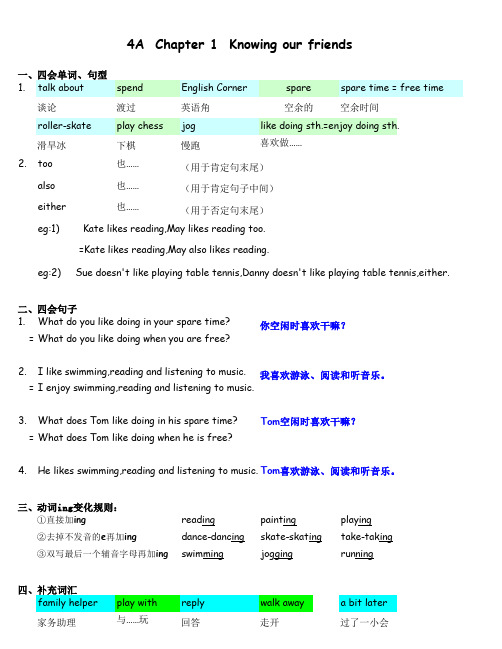香港朗文小学英语4A-Chapter1-Knowing our friends.ppt
香港朗文4A教学目标家长解读版

尊敬的各位家长:大家好!新学期新起点,新内容新目标。
现将本学期教学纲要整理如下,请家长查看。
希望在后期的教学中,能得到您的支持和配合,家校携手助力学生成长!四年级朗文英语上册:附第一单元导学单:4A chapter1 Knowing our friends了解我们的朋友们一.、重点单词和短语【Part A/B】1.read—reading读书2.paint—painting画画,侧重于上颜色(draw —drawing画画,偏向于画线条)3.dance—dancing跳舞4.roller-skate—roller-skating滑旱冰5.jog—jogging 慢跑6.swim—swimming游泳7.play—playing chess下棋8.listen—listening to music听音乐9.spare time 闲余时间10.like v.喜欢11.what pron.什么12.do v./aux 做(does单三)13.I 我(第一人称)14.you 你(第二人称)15.he 他(第三人称)16.she 她(第三人称)17.it它(第三人称)18.we我们(第一人称)19.you你们(第二人称)20.they他/她/它们(第三人称)【Part E】1.book display n.图书展示2.Central Library n.中央图书馆3.Sports Center n.运动俱乐部4.City plaza n.城市广场5.City Hall n. 市政厅6.Dance Day n.舞蹈日7.ice-skate --ice-skating v.溜冰8.play -playing table tennis v.打乒乓球9.too, 表肯定“也是”;either, 表否定“也不”10.at the weekend 在周末11.me too 我也是12.me either 我也不13.good idea 好主意【Part F】1.sing-singing v.唱歌2.play football --playing football v.踢足球3.can v.能够4.go dancing 去跳舞5.together adv.一起二、重点句型1.-What do you like doing in your spare time? 你在业余时间喜欢做什么?-I like swimming, reading and listening to music. 我喜欢游泳、读书和听音乐。
香港朗文4a各单元总结

4a各单元总结Unit One1.重点语法和单词:2.重点句型:(1) –What do you like doing?-- I like swimming, reading and listening to music(2) I like reading too.(3) I don’t like playing table tennis either.(4) Let’s go ice-skating.3.重点词组:4.动词的过去式Unit two1.重点语法和单词:2.重点句型:(1)--Do you ever tidy your room?-- Yes, I usually tidy my room.(2)—Does she ever play the violin?-- No, she never plays the violin.-- No, she doesn’t play the violin.3.重点词组:4.动词的过去式Unit Three1.重点语法:2.重点单词和词组:3.重点句型:(1)--Was there any cola when you were young?-Yes, there was.(2)The game I like best was marbles.(3)How do you play marbles?(4)– Did you wear trainers fifty years ago?--Yes, I did.(5)—Did you have a telephone?-- No, I didn’t. Rich people had telephones at home but poor people didn’t.(6 ) – Did you shop at the supermarket?--- No, I didn’t. There weren’t any supermarkets.(7) – Did you go to school?-- No, I didn’t. Rich children go to school but poor children didn’t.(8) –Did you listen to the radio?-- Yes, I did.Where(哪里)do you like going to in your holiday?How(如何)do you help at home?How much (多少钱,提问不可数名词)is it? --- It is five dollars. How many (多少,提问可数名词)books in your home?What time(什么时间)is it?What(什么)are you doing now? ----I am doing my homework. What(什么)is the weather like today? ----It’s windy.What color (什么颜色)is it? ---- It is red.What (什么)are you? ( What do you do?) -----I am a driver.When(什么时候)is your birthday? ---on 2nd MayHow old(多大)are you? ----I am ten.Who (谁) are you? -----I am David.Which(哪一个) club do you want to join?Why(为什么)do you like playing football?----Because I like being healthy.。
最新香港朗文4A各单元知识要点 词汇语法

4A Chapter1 背诵内容一.单词部分n.名词v.动词pron. 代词prep. 介词adj. 形容词adv. 副词conj. 连词num. 数词art. 冠词interj.感叹词Part I.1.activity [ækˈtɪvətɪ] n. 活动2.spare [speə] adj. 空余的,空闲的3.roller-skate ['rəʊləˌskeɪt] v./n. 滚轴溜冰; 滚轴溜冰鞋4.jog [dʒɒg] v. 慢跑5.too [tu:] adv. 太;也6.either [ˈaɪðə] adv./pron. 也(否定句);(两者中)任何一个7.reply [rɪˈplaɪ] v. 回答Part II. Past form(过去式)walk—walked ask—asked reply—replied say—said draw-drew be—was/were think—thought go—went get—got leave-leftPart III. Gerund (动名词)1 一般情况下,直接在动词后加-ingwork ---- working sleep ----- sleeping study ----- studying2 动词以不发音的-e结尾,要去-e加-ingtake ----- taking make ----- making dance ----- dancing3 重读闭音节的动词,且词尾字母符合辅元辅规则,要双写词尾字母,再加-ing cut ----- cutting put ----- putting begin ------ beginning单音节为重读音节,只是不写重音符合4 以-ie结尾的动词,把变成y再加-inglie ----- lying tie ----- tying die ----- dying二.词组部分1.i n one’s spare time在某人的空余时间2.listen to (the) music 听音乐3.play chess 下棋4.like/love/enjoy doing 喜欢干某事5.go swimming (去)游泳6.go jogging (去)慢跑7.go roller-skating (去)溜冰8.be good at sth./doing 擅长于某事/干某事9.be poor at sth./doing 不擅长于某事/干某事10.be interested in sth./doing 对干某事/干某事感兴趣11.be afraid of sth./doing 害怕某事/干某事12.at/on the weekend 在周末at/on weekends13.on weekdays 在工作日14.be busy with sth. 忙于某事15.be busy doing 忙于干某事16.enjoy oneself= have a good time 某人玩得很开心17.a family helper 一位家庭帮手18.pick up kids 接小孩19.play the piano/violin 弹钢琴,拉小提琴(西洋乐器名词前加the )20.play Erhu 拉二胡(民族乐器前无the)21.play table tennis 打羽毛球(球类名词前无the)22.play on the swing/slide 在秋千(滑滑梯)上玩23.play with sb. 与某人一起玩24.play with sth. 玩耍某物25.a bit later 一会儿以后26.walk away sadly 难过地走开了27.walk the dog 溜狗28.walk home=go home on foot 走回家29.go home =go back home 回家30.after that 在那以后31.the black notes (钢琴上)黑键32.see sb. doing 看到某人在干某事33.make a new friend named Tom 交了一个叫汤姆的朋友34.in fact = actually/ˈæktʃʊəlɪ/事实上35.in the gym 在体育馆36.indoor stadium /'steɪdɪəm/ 室内体育馆37.finish sth./doing sth. 完成某事/干某事38.be important to sb. 对某人而言是重要的(绿色字体部分为拓展内容,供学有余力的小朋友默写。
【g】l朗文—4achapter1

Kids can:
3.Kids can use the words and the sentences.
e the sentences to describe the hobbies.
Warm up:
Sing a song.-forever friends(coco)
Warm up:
Sing a song.-forever friends(coco)
1.Did you preview the words last night?
1.What do you like doing in your spare time?
2.Do you want to know others ‘hobbies?
1.Learn the words byflashing cards.
1.Listen to E-book and check the words then play guessing game.
2.Talk about theirhobbiesin groups, andinterview others.
4.The song’s video.
5.Flash card.
6.E-book.
Emphasis
Use the dialogue:
What doeshelike doing inhisspare time?
Helikesswimming/reading/listening to music.
Reflection:
2. Kids can act the short in roles.
3.Kids can introduce themselves.
Chapter1Knowingourfriends(课件)-新思维小学英语4A

I don’t like singing,my best friend doesn’t like singing either.
6. 我们回家吧。 Let’s go home.
7. 我们一起吃午饭吧。 Let’s have lunch together.
+5 +5
+5
Post-reading
Translate
12. walk the dog
13. longer
Postห้องสมุดไป่ตู้reading
Let’s practise and retell the story!
Post-reading
Translate
1. 一天,Ron和家庭助手正从学校走回家。 Ron and the family helper were walking home from school one day. 2. 一天,我正从学校走向超市。
present continuous tense
肯定句
主语+be+v-ing+其他
He is reading a book.
否定句 一般疑问句 常见时间标志词
主语+be+not+v-ing+其 他
be+主语+v-ing+其他
now ; Look ; Listen
He is not reading a book.
4. I am so happy because I like playing___ my sister.
5. When I ___home, I saw my mom is cooking.
6. I have a ruler, it is _____than my deskmate’s.
朗文4AChapter1复习提要

《朗文英语4A》复习提要Chapter 1: Knowing our friends了解我们的朋友们I. 经过第1章的学习,下面的新单词我们要准确无误地读(read them correctly),知道它们的中文意思(know the Chinese meaning),不看书进行英汉互译(translate),并且还要会拼写( spell)。
一般动词后面加ing:read---read ing读书paint---paint ing画画play chess---play ing chess 下棋listen to music---listen ing to music 听音乐以e结尾的动词,并且不发音,去e后加ing:dance---danc ing 跳舞roller-skate----roller-skat ing溜旱冰(同样变化的动词还有:ride-riding, dive-diving, write-writing, drive-driving, ice-skate-ice-skating)词尾“辅元辅”双写词尾加ing:jog---jo gg ing 慢跑swim---swi mm ing 游泳(同样变化的动词还有: sit-si tt ing, put-pu tt ing, run-ru nn ing)II.句型:like +doing喜欢做某事下面的关键句型我们要会读(read), 知道意思(know the Chinese meaning), 会根据不同的语境来运用(use them in different contexts),会写(write them correctly)。
English corner英语角(在英语角我们用英语交流,是练习英语口语的地方)in your spare time 在你的空闲时间= when you are free 当你空闲时1. ---What do you like doing in your spare time?---I like swim ming, reading and listen ing to music.2. ---What do you like doing in your spare time?--- I like roller-skat ing, paint ing and read ing.拓展:--What do you like doing in your spare time?--I like shopping, reading books and cooking.--What do you like doing?--…注意:like 后面的动词要用ing形式,不管动词离like有多远,都要记得用ing 形式。
香港朗文4A单词及句子.xls

4A Chapter 1 Knowing our friends一、四会单词、句型1.talk about spend English Corner spare spare time = free time谈论 渡过英语角空余的空余时间roller-skate play chess jog like doing sth.=enjoy doing sth.滑旱冰下棋慢跑喜欢做……2.too也……(用于肯定句末尾)also也……(用于肯定句子中间)either也……(用于否定句末尾)eg:1) Kate likes reading,May likes reading too.=Kate likes reading,May also likes reading.eg:2) Sue doesn't like playing table tennis,Danny doesn't like playing table tennis,either.二、四会句子1.What do you like doing in your spare time?你空闲时喜欢干嘛?=What do you like doing when you are free?2.I like swimming,reading and listening to music.我喜欢游泳、阅读和听音乐。
=I enjoy swimming,reading and listening to music.3.What does Tom like doing in his spare time?Tom空闲时喜欢干嘛?=What does Tom like doing when he is free?4.He likes swimming,reading and listening to music.Tom喜欢游泳、阅读和听音乐。
三、动词ing变化规则:①直接加ing reading painting playing②去掉不发音的e再加ing dance-dancing skate-skating take-taking③双写最后一个辅音字母再加ing swimming jogging running四、补充词汇family helper play with reply walk away a bit later家务助理与……玩回答走开过了一小会solve puzzle sadly boring notes解决疑惑伤心地沉闷键盘piano slide swing钢琴滑梯秋千the youth center book dispiay central library 青少年活动中心书展中心图书馆sport centre City Hall city plaza体育活动中心市政厅市民广场4A Chapter 2 More about our friends一、四会单词和短语look after go to bed early late eat out get up 照顾,照看上床睡觉早迟外出用餐起床surf the Net play the recorder play the violin often sometimes always 上网吹直笛拉小提琴常常有时总是usually once twice never ever通常一次两次从不曾经二、三会单词polite same spilt(spill过去式)有礼貌相同的溢出angry invite friendly生气邀请友善的take photos cookbook wish拍照烹饪书希望三、四会句子1.Do you ever tidy your room?你曾经整理你的房间吗?yes,I usually tidy my room.是的,我经常整理我的房间。
最新香港朗文4A各单元知识要点 词汇语法

4A Chapter1 背诵内容一.单词部分n.名词v.动词pron. 代词prep. 介词adj. 形容词adv. 副词conj. 连词num. 数词art. 冠词interj.感叹词Part I.1.activity [ækˈtɪvətɪ] n. 活动2.spare [speə] adj. 空余的,空闲的3.roller-skate ['rəʊləˌskeɪt] v./n. 滚轴溜冰; 滚轴溜冰鞋4.jog [dʒɒg] v. 慢跑5.too [tu:] adv. 太;也6.either [ˈaɪðə] adv./pron. 也(否定句);(两者中)任何一个7.reply [rɪˈplaɪ] v. 回答Part II. Past form(过去式)walk—walked ask—asked reply—replied say—said draw-drew be—was/were think—thought go—went get—got leave-leftPart III. Gerund (动名词)1 一般情况下,直接在动词后加-ingwork ---- working sleep ----- sleeping study ----- studying2 动词以不发音的-e结尾,要去-e加-ingtake ----- taking make ----- making dance ----- dancing3 重读闭音节的动词,且词尾字母符合辅元辅规则,要双写词尾字母,再加-ing cut ----- cutting put ----- putting begin ------ beginning单音节为重读音节,只是不写重音符合4 以-ie结尾的动词,把变成y再加-inglie ----- lying tie ----- tying die ----- dying二.词组部分1.i n one’s spare time在某人的空余时间2.listen to (the) music 听音乐3.play chess 下棋4.like/love/enjoy doing 喜欢干某事5.go swimming (去)游泳6.go jogging (去)慢跑7.go roller-skating (去)溜冰8.be good at sth./doing 擅长于某事/干某事9.be poor at sth./doing 不擅长于某事/干某事10.be interested in sth./doing 对干某事/干某事感兴趣11.be afraid of sth./doing 害怕某事/干某事12.at/on the weekend 在周末at/on weekends13.on weekdays 在工作日14.be busy with sth. 忙于某事15.be busy doing 忙于干某事16.enjoy oneself= have a good time 某人玩得很开心17.a family helper 一位家庭帮手18.pick up kids 接小孩19.play the piano/violin 弹钢琴,拉小提琴(西洋乐器名词前加the )20.play Erhu 拉二胡(民族乐器前无the)21.play table tennis 打羽毛球(球类名词前无the)22.play on the swing/slide 在秋千(滑滑梯)上玩23.play with sb. 与某人一起玩24.play with sth. 玩耍某物25.a bit later 一会儿以后26.walk away sadly 难过地走开了27.walk the dog 溜狗28.walk home=go home on foot 走回家29.go home =go back home 回家30.after that 在那以后31.the black notes (钢琴上)黑键32.see sb. doing 看到某人在干某事33.make a new friend named Tom 交了一个叫汤姆的朋友34.in fact = actually/ˈæktʃʊəlɪ/事实上35.in the gym 在体育馆36.indoor stadium /'steɪdɪəm/ 室内体育馆37.finish sth./doing sth. 完成某事/干某事38.be important to sb. 对某人而言是重要的(绿色字体部分为拓展内容,供学有余力的小朋友默写。
